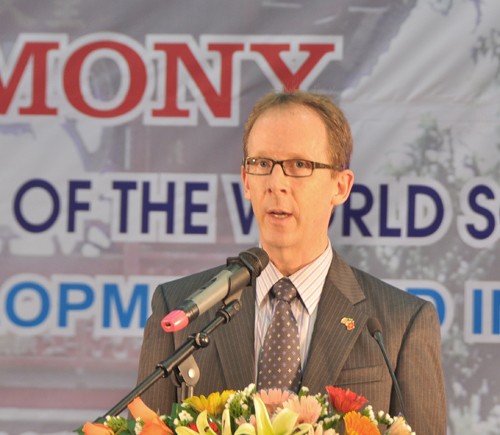
HANOI, September 8, 2013 -- Her Excellency Nguyen Thi Doan, Vice President of the Socialist Republic of Vietnam;
Ms. Pham Thi Hai Chuyen, Minister of Labor and Social Affairs;
Distinguished representatives of government and the National Assembly;
Esteemed colleagues from universities and international organizations; and
Dr. Nguyen Van Minh, President of Hanoi University of Education
It is a pleasure on behalf of the U.S. Government to join you at this joyful and inspiring event marking International Social Work Day. I would especially like to thank our host, Dr. Nguyen Van Minh and his colleagues at Hanoi National University of Education for making this event possible, as well as Vice President Doan, Minister Chuyen and all of you for being committed to the future of social work in Vietnam.
I speak today to honor the important role that social workers can fulfill. In many countries including my own, social workers are recognized for the invaluable work they do with vulnerable children and people who are poor, disabled, or suffer disadvantages. They work in our schools, our hospitals, our prisons, and our government. The International Federation of Social Workers describes social work as an effort to “address the barriers, inequities and injustices that exist in society.” What is more vital and laudable than that? Celebrating Social Work day is one way of recognizing the contributions of social workers around the world.
Social work as a profession in Vietnam is relatively new. You know the need to quickly increase the number of trained social workers. According to recent figures from MOLISA there are 6 million people with disabilities, nearly 3 million poor families and about 1.5 million children orphaned, abandoned, or who are victims of violence, abuse, or neglect. Within Vietnamese communities there are victims of family violence, drug and alcohol abuse, HIV/AIDS and homelessness. Their care and social and economic inclusion would be made easier through the attention of social work services.
In 2010 the Prime Minister announced a target of graduating an extra 6,000 new social workers by 2015. Through our collaboration we seek to help ensure that these social workers are equipped with the skills necessary to fill the many expectations placed on them.
With this target in mind, USAID began work with San Jose State University on a social work education project aimed at building the caliber of social work education programs and helping universities produce trained, skilled, and job-ready social workers. Many of you here have already begun training through this program and I am happy to report that we have heard positive feedback coming out of our on-going trainings and consultations.
While our program can only work on a small scale, we hope that the curricula and field-based teaching methods used and established through this program can serve as a model to be replicated throughout Vietnam and access to social work services can grow.
USAID’s efforts to build social work capacity in Vietnam also extend to cooperation with other partners to help professionalize social workers already on the job to work with persons with disabilities. USAID has worked with a number of the universities here today to develop curricula, textbooks, and field-based teaching methods for social workers and persons with disabilities. So we support both faculty development activities as well as the training of front-line social workers to attend to the needs of people with disabilities.
At the core of the USAID program is an emphasis on field-based teaching methods. The classroom environment is of course useful for teaching theory but the practice of social work must be part of the training. If there is one message that emerges during the next two days I hope it is that field work is the single best way to improve teaching outcomes for social work graduates.
I believe that the American people would be proud of our partnership’s support for your efforts to build the social work profession. I am heartened to see such sincere interest in helping to grow the social work profession in Vietnam and I look forward our future collaboration.
Xin cam on.







Comment
Make a general inquiry or suggest an improvement.